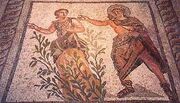(Created page with "thumb|An mosaic of Liber and LiberaLiber and Libera, in Roman religion, a pair of fertility and cultivation deities of uncertain origin. Li...") |
No edit summary |
||
| (20 intermediate revisions by 7 users not shown) | |||
| Line 1: | Line 1: | ||
| + | {{Stack begin}}{{Infobox OTL Deities |
||
| − | + | |name = Liber and Libera|image = Liber_and_Libera.jpg|religion = Ancient [[Roman]] Pantheon|god of = Fertility and Cultivation}}{{Clearright}}{{Household Gods Historical Character|type of appearance = Direct {{POV}}}}{{Stack end}}'''Liber and Libera''', in [[Roman Republic|Roman]] religion, a pair of fertility and cultivation deities of uncertain origin. Liber, though an old and native [[Italian]] deity, came to be identified with [[Dionysus]]. The triad Ceres, Liber, and Libera (his female counterpart) represented in [[Roman Empire|Rome]], from early times and always under [[Ancient Greek|Greek]] influence, the Eleusinian Demeter, Iacchus-Dionysus, and Kore (Persephone). Ovid (Fasti, Book III) identifies Libera with the deified Ariadne. At the festival of the Liberalia, held at [[Rome]] on 17 March, the toga virilis was commonly assumed for the first time by boys who were of age. At the town of Lavinium, a whole month was consecrated to Liber, and the festival activities there were believed to make the seeds grow. |
|
| ⚫ | |||
| ⚫ | |||
| ⚫ | |||
| ⚫ | |||
| ⚫ | Pleased to receive prayers after centuries of devotees (and their prayers) going to that "simpering [[Ancient Greece|Greek]]" [[Dionysus]], the two gods '''Liber and Libera''' were more than happy to grant [[Nicole Gunther]]'s wish that she could live in the days of [[Roman Empire (Household Gods)|Ancient Rome]] instead of modern [[los Angeles (Household Gods)|Los Angeles]]. Gunther had a plaque of the two gods sent to her home after a tour of [[Carnuntum (Household Gods)|Carnuntum]] and had been holding it while making her wish. The fact the plaque depicted the god and goddess being clearly equal partners in their divine business and happy in each other's company gave Gunther a very wrong impression of gender roles in the Roman society. |
||
| ⚫ | |||
| + | |||
| ⚫ | |||
| ⚫ | |||
| + | |||
| + | Nicole soon learned from her [[Slavery (Household Gods)|slave]] [[Julia (Household Gods)|Julia]] that the two gods weren't gods of liberty ''per se'', they were gods of liberty of living life to fullest - i.e., drinking and other debauchery. Finally, feeling generous, the gods granted Nicole her wish to return to her home century. They were amused when the mortal attributed all the pleasant changes in her life on them, as she had done them herself. |
||
| + | |||
| + | Finally having had enough of living in the Roman Empire and finding the same plaque in its original location, Gunther begged the two gods to return her to the 20th Century. Though puzzled, as they regarded Roman times as much the better period of the two, the good-natured gods again granted her wish. |
||
| ⚫ | |||
| ⚫ | |||
Revision as of 04:14, 30 July 2020
| ||||||||||||||||
Liber and Libera, in Roman religion, a pair of fertility and cultivation deities of uncertain origin. Liber, though an old and native Italian deity, came to be identified with Dionysus. The triad Ceres, Liber, and Libera (his female counterpart) represented in Rome, from early times and always under Greek influence, the Eleusinian Demeter, Iacchus-Dionysus, and Kore (Persephone). Ovid (Fasti, Book III) identifies Libera with the deified Ariadne. At the festival of the Liberalia, held at Rome on 17 March, the toga virilis was commonly assumed for the first time by boys who were of age. At the town of Lavinium, a whole month was consecrated to Liber, and the festival activities there were believed to make the seeds grow.
Liber and Libera in Household Gods
Pleased to receive prayers after centuries of devotees (and their prayers) going to that "simpering Greek" Dionysus, the two gods Liber and Libera were more than happy to grant Nicole Gunther's wish that she could live in the days of Ancient Rome instead of modern Los Angeles. Gunther had a plaque of the two gods sent to her home after a tour of Carnuntum and had been holding it while making her wish. The fact the plaque depicted the god and goddess being clearly equal partners in their divine business and happy in each other's company gave Gunther a very wrong impression of gender roles in the Roman society.
The two gods, taking the wish for a real prayer, obliged by sending Gunther to ancient Carnuntum, into the body of Nicole's distant ancestor, Umma. They added the ability to speak and comprehend Latin as a bonus.
Nicole soon learned from her slave Julia that the two gods weren't gods of liberty per se, they were gods of liberty of living life to fullest - i.e., drinking and other debauchery. Finally, feeling generous, the gods granted Nicole her wish to return to her home century. They were amused when the mortal attributed all the pleasant changes in her life on them, as she had done them herself.
Finally having had enough of living in the Roman Empire and finding the same plaque in its original location, Gunther begged the two gods to return her to the 20th Century. Though puzzled, as they regarded Roman times as much the better period of the two, the good-natured gods again granted her wish.
| |||||||||||
